A Look At Hampton Roads History
 LeeG
Posts: 12,162 ✭
LeeG
Posts: 12,162 ✭
This area I live in is rich in American History. Here's a little taste: 
Petite park honors a revolutionary ally
On a gray morning this past Friday, amidst flourishes by a Fort Monroe brass quintet, the presentation of colors by the Churchland High Marine Corps JROTC, welcome remarks, speeches and refreshments, a small granite bench was dedicated at a small, almost-forgotten park in Portsmouth.
But the fellow for whom the park is named, a brash and dashing Frenchman, is not one to be left unremembered in this part of the world. The Marquis de Lafayette was so moved by the idea of liberty for all the he risked his life, his fortune and his reputation for the young country and helped win its independence.
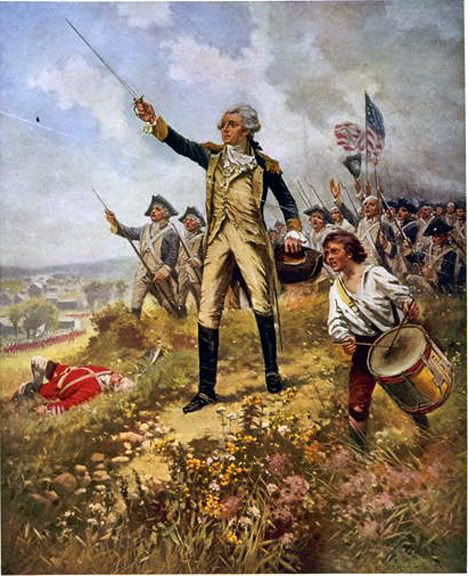
"Lafayette's Baptism of Fire" by Edward Percy Moran (ushistory.org)
Lafayette was only 19 and already an experienced soldier when he set sail for America. He journeyed to Philadelphia and charmed Congress - especially because he offered to serve as a volunteer and pay his own expenses - that he was made a major general.
He served as an aide to George Washington, then as commander of American forces in several engagements with the British, winning praise for his gallantry and skill. He returned home and almost hingle-handedly persuaded the French to send forces under General Jean Baptiste Rochambeau to help Washington and ships under Admiral Francois-Joseph de Grasse to set sail from the West Indies to blockade the Chesapeake.
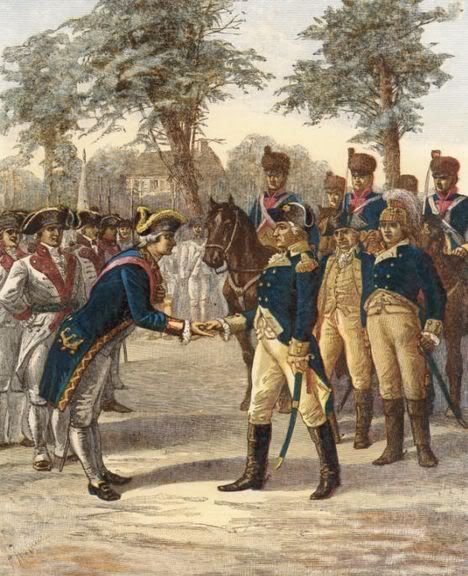
Gen Rochambeau Being Received by General Washington (googleimages.com)
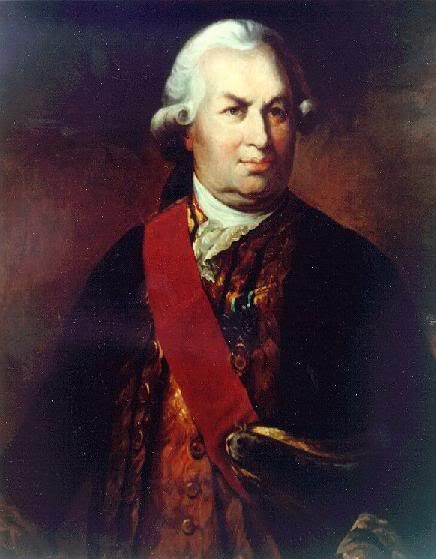
Amiral François Joseph Paul, marquis de Grasse Tilly, comte de Grasse (1722-1788) (wikipedia.org)
Now in Virginia, commanding 1,200 men he fed and clothed, Lafayettet dogged the forces led by Lord Cornwallis, forcing the British General to retreat toward his new base at Yorktown. Cornwallis boasted, "The boy cannot escape me," but he did again and again.
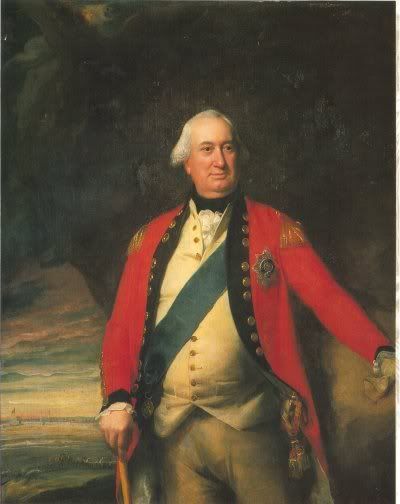
Lord Cornwallis (goggleimages.com)
Washington, by now on the march from New York, pleaded with Lafayette to prevent Cornwallis from escaping, and he did just that, sealing the British officers's doom. Then, during the siege of Yorktown, Lafayette led the charge on a crucial redoubt and captured it in hand-to-hand combat.
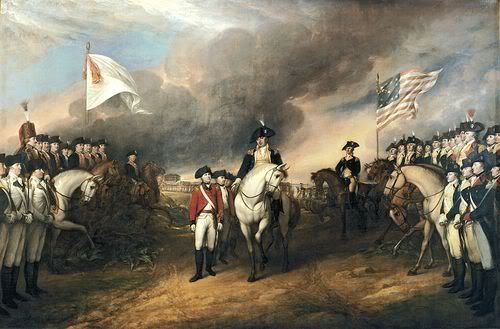
Surrender of Cornwallis at Yorktown (googleimages.com)
Some think of him as a lightweight because of his charismatic, charming nature, but he was a skilled diplomat and soldier who earned Washington's respect and friendship. The feeling was mutual, and the Frenchman named his son George Washington Lafayette.
"The fact that he and Washington got along so well is the reason for his place in American history," says J. Alf Mapp, the respected historian who wrote "The Virginian Experiment: The Old Dominion's Role in the Making of America, 1607-1781."
Lafayette was lionized on both sides of the Atlantic. In 1824, at the invitation of Congress, he made a grand tour of the then-24 states. After stopping in Williamsburg, he boarded a steamer at Jamestown and sailed to Norfolk. The next day, he hopped across the Elizabeth to Portsmouth, where a victory arch had been built in his honor. He dined at a home on Crawford and Glasgow streets, then crossed back to Norfolk to attend a lavish ball.
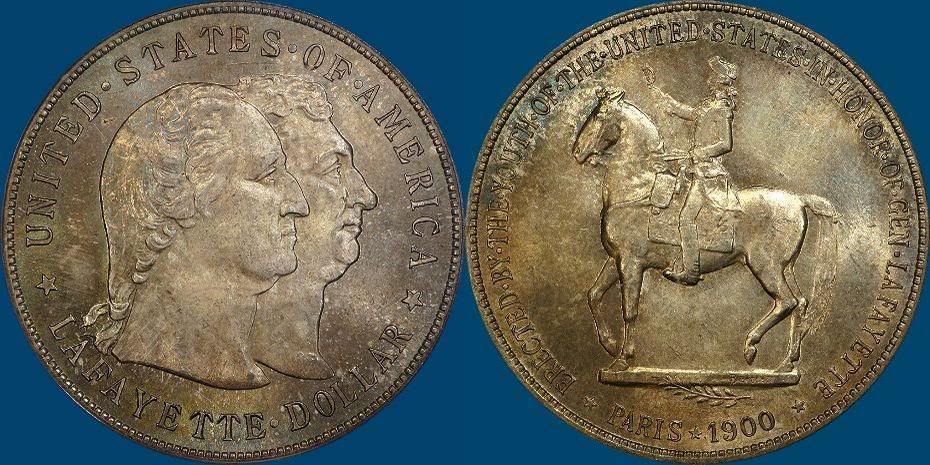
PCGS MS65 (larrywhitlow.com)
But the love affair with Lafayette was not what you'd call mutual, mostly because he had long detested slavery. Auguste Lavasseur, Lafayette's private secretary, kept a journal in which he observed that of all the cities they had visited, "Norfolk is the one that offers the least agreeable appearance." He added that the city was further marred by the "sad and revolting spectacle" of slaves being forced to work for uncaring masters.
There are probably a half dozen places in Norfolk that bear the name Lafayette, including a river, park, boulevard and library. Portsmouths park, across the Crawford Parkway from the Renaissance hotel, has a brick arch dedicated "to all who have lived or died for freedom." It was inspired by the temporary arch that greeted the conquering hero.
During the dedication last week, one of the members from the Portsmouth Area Council of Garden Clubs, which donated the bench, said she often refers to the Marquis de Lafayettte Park as postage-size and forgotten.
The little park may have been forgotten, but not the man who so loved America.
As written by Paul Clancy; The Virginian Pilot, 05/10/09
Petite park honors a revolutionary ally
On a gray morning this past Friday, amidst flourishes by a Fort Monroe brass quintet, the presentation of colors by the Churchland High Marine Corps JROTC, welcome remarks, speeches and refreshments, a small granite bench was dedicated at a small, almost-forgotten park in Portsmouth.
But the fellow for whom the park is named, a brash and dashing Frenchman, is not one to be left unremembered in this part of the world. The Marquis de Lafayette was so moved by the idea of liberty for all the he risked his life, his fortune and his reputation for the young country and helped win its independence.

"Lafayette's Baptism of Fire" by Edward Percy Moran (ushistory.org)
Lafayette was only 19 and already an experienced soldier when he set sail for America. He journeyed to Philadelphia and charmed Congress - especially because he offered to serve as a volunteer and pay his own expenses - that he was made a major general.
He served as an aide to George Washington, then as commander of American forces in several engagements with the British, winning praise for his gallantry and skill. He returned home and almost hingle-handedly persuaded the French to send forces under General Jean Baptiste Rochambeau to help Washington and ships under Admiral Francois-Joseph de Grasse to set sail from the West Indies to blockade the Chesapeake.

Gen Rochambeau Being Received by General Washington (googleimages.com)

Amiral François Joseph Paul, marquis de Grasse Tilly, comte de Grasse (1722-1788) (wikipedia.org)
Now in Virginia, commanding 1,200 men he fed and clothed, Lafayettet dogged the forces led by Lord Cornwallis, forcing the British General to retreat toward his new base at Yorktown. Cornwallis boasted, "The boy cannot escape me," but he did again and again.

Lord Cornwallis (goggleimages.com)
Washington, by now on the march from New York, pleaded with Lafayette to prevent Cornwallis from escaping, and he did just that, sealing the British officers's doom. Then, during the siege of Yorktown, Lafayette led the charge on a crucial redoubt and captured it in hand-to-hand combat.

Surrender of Cornwallis at Yorktown (googleimages.com)
Some think of him as a lightweight because of his charismatic, charming nature, but he was a skilled diplomat and soldier who earned Washington's respect and friendship. The feeling was mutual, and the Frenchman named his son George Washington Lafayette.
"The fact that he and Washington got along so well is the reason for his place in American history," says J. Alf Mapp, the respected historian who wrote "The Virginian Experiment: The Old Dominion's Role in the Making of America, 1607-1781."
Lafayette was lionized on both sides of the Atlantic. In 1824, at the invitation of Congress, he made a grand tour of the then-24 states. After stopping in Williamsburg, he boarded a steamer at Jamestown and sailed to Norfolk. The next day, he hopped across the Elizabeth to Portsmouth, where a victory arch had been built in his honor. He dined at a home on Crawford and Glasgow streets, then crossed back to Norfolk to attend a lavish ball.

PCGS MS65 (larrywhitlow.com)
But the love affair with Lafayette was not what you'd call mutual, mostly because he had long detested slavery. Auguste Lavasseur, Lafayette's private secretary, kept a journal in which he observed that of all the cities they had visited, "Norfolk is the one that offers the least agreeable appearance." He added that the city was further marred by the "sad and revolting spectacle" of slaves being forced to work for uncaring masters.
There are probably a half dozen places in Norfolk that bear the name Lafayette, including a river, park, boulevard and library. Portsmouths park, across the Crawford Parkway from the Renaissance hotel, has a brick arch dedicated "to all who have lived or died for freedom." It was inspired by the temporary arch that greeted the conquering hero.
During the dedication last week, one of the members from the Portsmouth Area Council of Garden Clubs, which donated the bench, said she often refers to the Marquis de Lafayettte Park as postage-size and forgotten.
The little park may have been forgotten, but not the man who so loved America.
As written by Paul Clancy; The Virginian Pilot, 05/10/09
0
Comments
<< <i>great post. are you a history major? >>
Nah, just a lover of coins and the history associated with them and how it relates to America.
Coin's for sale/trade.
Tom Pilitowski
US Rare Coin Investments
800-624-1870
<< <i>Was the 1900 Lafayette commerative copied from this dollar sized medal?
May be a silver round made into a coaster which is a novelty item.
Who played the drums or blew the bugle when that person got shot or killed.
If our military was smart they would of had C-4 inside their musical instruments and use them as booby traps. Just a thought.
<< <i>
<< <i>Was the 1900 Lafayette commerative copied from this dollar sized medal?
May be a silver round made into a coaster which is a novelty item. >>
The medal shown is listed as Baker 452C - 1881 - WM 50MM plain edge Rarity 4
<< <i>Was the 1900 Lafayette commerative copied from this dollar sized medal? >>
May be a silver round made into a coaster which is a novelty item.
<< <i>The medal shown is listed as Baker 452C - 1881 - WM 50MM plain edge Rarity 4 >>
Oops.
QDB writes:
The die work for the Lafayette dollar was accomplished by Chief Engraver Charles E. Barber, who, according to conventional history, took the portrait of Washington from the famous bust by Jean Antoine Houdon. Lafayette's portrait, which appears behind and slightly forward of Washington's, was said to have been taken from an 1824 "Defender of American and French Liberty" medal made in France by Francois Augustin Caunois.
However, as historian Arlie Slabaugh has pointed out, the conjoined portraits of Washington and Lafette on the obverse of the 1900 commemorative dollar were almost certainly plagiarized by Barber from the obverse of the Yorktwon Centennial medal of 1881, made from dies engraved by Peter L. Krider. Stated more kindly, the Yorktown medal was an intermediary between the commemorative dollar and the earlier work of Houdon and Caunois. The shallow relief of Barbers work is but a travesty of Krider's extremely detailed high-relief artistry.
Famous bust by Jean Antoine Houdon
1824 "Defender of American and French Liberty" medal
Nice Job TavernTreasures!
Great post Lee.
"Inspiration exists, but it has to find you working" Pablo Picasso